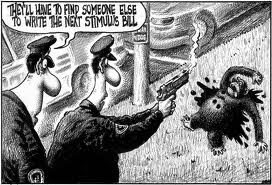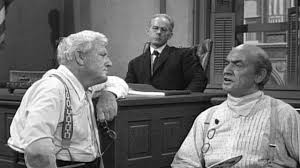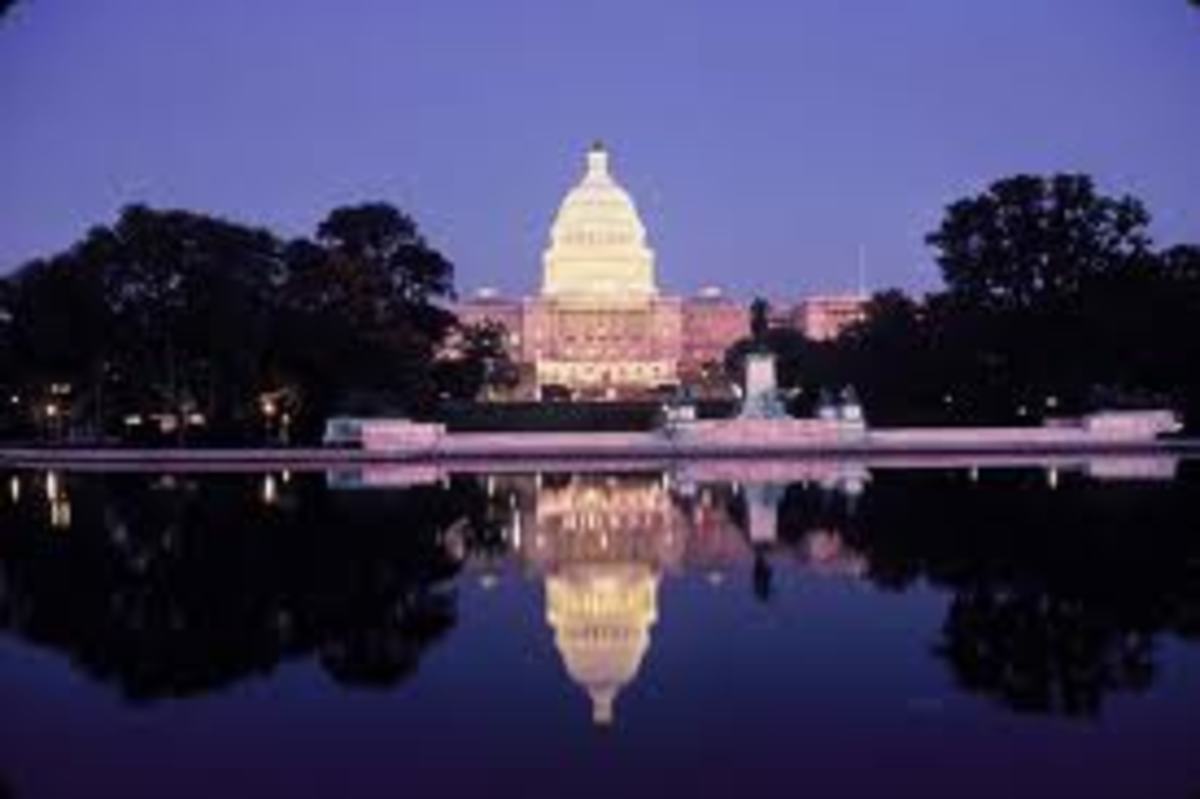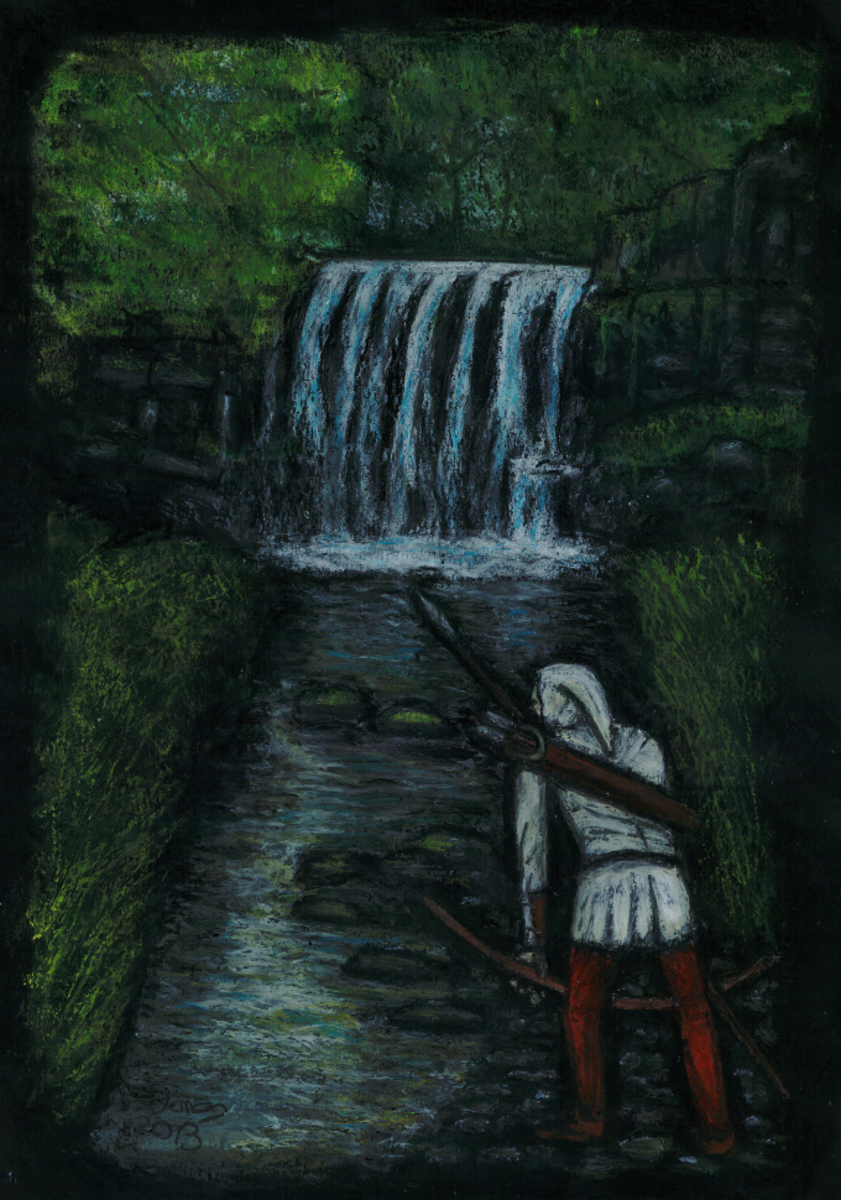The Devil's Cut: The Mystery of Race and Intelligence in the United States of America: A Speculative Essay

You know those Jim Beam Devil's Cut commercials? Do you remember the one that shows a barrel; and then, apparently, some giant, invisible hand squeezes the barrel, and then a mist shoots into the air? Then the male voiceover (or sometimes actress Mila Kunis) explains that the mist is the "angels' share"; the stuff that remains trapped within the wood---which Jim Beam has learned to extract---is a deeper, richer potion, the "Devil's Cut."
I love that. I don't even drink, but I love that! It is a good metaphor for what we're going to discuss: a bit of cultural and intellectual history. It is always interesting to trace where, things we have always taken for granted, came from. The idea of extraction---as with the Jim Beam bourbon---will be particularly resonant, I think, in that regard.
Now before we get started, let me get something out of the way. I do not believe in I.Q. testing and scoring. I do not believe that 'intelligence' is something that can be measured and assigned a number, which is supposed to represent that measurement. I also do not believe that intelligence is static, forever chained to an arbitrary, imaginary number.
The question for us is simply this: Why do we believe that intelligence is a measurable, static characteristic? I will try to give some historical insight into that question with this essay.
We might as well get started by quoting the words of professor of history, Winthrop D. Jordan, from a book he published in 1968:
"[E]ighteenth-century ideas about human intelligence are almost disconcertingly imprecise when set aside the presuppositions which underlie modern intelligence tests. The bewildering variety of words then used to denote what we call intelligence was symptomatic of an underlying vagueness about the abilities in men which, it was half recognized, were inborn rather than acquired. 'Capacity,' 'faculty,' and 'understanding' generally indicated mental (and sometimes emotional and manual) abilities which were 'natural,' that is, what we would call 'innate.' Yet these terms were applied indiscriminately to abilities which could not be changed and those that could (1).
"In the early eighteenth-century the concept of intelligence had not yet become dissociated from the idea of capacity for religious experience or even the idea of wisdom. The attribute we frequently term 'I.Q.' did not even appear distinct from attributes which we might term 'spirituality,' 'disposition,' and 'learnedness' (2).
"This absence of clear-cut distinction and interacting of mental capacity with spiritual grace also becomes manifest in the fact that the issue of the Negro's mental ability first arose historically out of doubts concerning his ability to participate in the experiences of conversion. So long as men thought of themselves as primarily spiritual creatures, no one could possibly talk about innately inferior intelligence in the sense that the concept is used today (3).
"Paradoxically, the vagueness of the demarcation between inherent and acquired attributes in men itself helped pave the way for later assertions of Negro stupidity" (4).

Question: Why were there "doubts concerning" the African's "ability to participate in the experiences of conversion," which "helped pave the way for later assertions of" black "stupidity"?
Before we get into that, let me just point out one practical consequence of this stance toward black people. During the colonial period, blacks were basically denied access to the court system. The thinking was that witnesses must take oaths, that in order for the oaths to be meaningful, the oath-giver had to be Christian, that blacks were heathens, but that their conversion would, perhaps, require their manumission, which was, of course, a non-starter at the time (5).
In the southeastern region of the country, this process went a step further. Under the ethos of the Code of Honor, the ban on black testimony was based on notions of truthfulness as a mark of honor and that blacks---permanently and unalterably dishonest---can always be expected to lie (6).
And yet there was a contradiction in this process. In the words of legal scholar, William W. Fisher III: "In the antebellum period, however, the evangelical faith in the capacity of all persons, including Negroes, to appreciate Christ's essential teaching, combined with the general acceptance of the view that conversion did not necessitate emancipation helped erode the ban on black testimony" (7).
Possible Cultural Implications
If you asked white Americans what they think the black Christian Church, in the United States, is all about, I think you would get a consensus view that emphasizes the, shall we say, heightened relative effusiveness of their praise of the Lord: loud singing, clapping, dancing, epileptic-like, convulsive 'catching-the-spirit,' 'speaking in tongues,' 'falling out' in ecstasy,, the rather rhythmic, musical quality to the preacher's sermon, and so forth. And, I daresay, if you pressed a little bit, you would get the idea that maybe black religious practices is not quite as 'smart,' in this regard, or that it 'lacks sophistication' of understanding found in their white counterparts' religious practice.
There was an article in the March/April 2012 edition of The Humanist magazine by Fred Edwords, spelled with an 'o.' The question the article is trying to answer is this: Why are people of color so lacking an overt humanist---which is to say, basically atheist---presence today?
According to a 2009 Pew Forum study---"A Religious Portrait of African-Americans in the United States"---87 percent of African-Americans polled described themselves as 'religious'; 88 percent called themselves 'absolutely certain God exists.' Incidentally, in other Pew surveys Latinos had similarly high figures (8). Also, in 2009, the Borna Group reported that 92 percent of African-Americans identified as Christian, and were more likely than whites to call themselves 'born again,' and had a faith that was 'moving in the direction that is more aligned with conservative biblical teachings.' Again, similar results were recorded for Hispanics (9).
Fred Edwords wrote: "[U]nlike minorities living in oppressed neighborhoods or working hard to gain middle-class acceptance, whites generally lack the bunker mentality or out-group status that tends to promote cultural conformity and identity politics" (10)
The Edwords article relies heavily on a book written feminist-atheist activist and author, Sikivu Hutchinson: Moral Combat: Black Atheists, Gender Politics, and the Values Wars (2011). He described her thesis roughly this way: The legacy of Jim Crow and de facto segregation has limited black residential mobility, creating socioeconomic conditions in which black Americans of all classes, incomes, and education levels live in close proximity to one another. As a consequence of this, African-Americans find themselves to be the single most segregated group in the United States of America (11).
After the formal abolition of slavery, blacks were still regarded as inferior by whites. Faced with this, the article says: "American blacks rejected as exemplars the slave-owning freethinkers of the Enlightenment in favor of a biblical Jesus who spoke to the humanity of the most dispossessed elements of society, and of a living God who would dole out just deserts with an even hand in the next life" (12).
Sikivu Hutchinson adds that the American blacks' acceptance of Christianity 'gave African slaves purchase on being human, on being American, on being moral.' Edwords says that the black adoption of Christianity seemed to force whites to recognize them as fellow believers. This was the "price of admission," as it were, for eventual citizenship and acceptance (13).
I think all of that is exactly right. Consider what black people living in America during the colonial period through the Civil War, might have been thinking. At the end of the Civil War, black people would have been faced with the prospect of being free citizens for the first time. The question for them would have been: How are we going to succeed in this country, moving forward?
One thing they would have been aware of, I think, would have been the fact that the court system would be, more or less, blocked to them, certainly as long as white America seemingly remained unconvinced as to the depth and sincerity with which black people internalized Christianity (so that their oaths could be believed and so forth). Now, what if that motivation provided the impetus for black people, back then, to not only become Christian, but vehemently Christian?
And what if that initial, more or less community---perhaps collectively unconscious---decision follows us to the present, as what is behind the relatively effusive practice of Christian worship in the black American church, in general?
A cynical person, could, perhaps, find reason to believe that those efforts, on the part of African-Americans,---if there were efforts---have been a complete failure (14).

Evolution
Okay, let's go back to the original question. Why were there "doubts concerning" the African's "ability to participate in the experiences of conversion," which "helped pave the way for later assertions of" black "stupidity"?
Let's hear from Dr. Jordan again. First of all, going back to the sixteenth century, a number of English travelers in Africa had claimed to have discovered rudiments of the Christian Word among even the most barbarous 'heathens' (15).
"In 1623 Richard Jobson exclaimed that 'they have a wonderous reference, to the leviticall law, as it is in our holy Bible related; the principals whereof they are not ignorant in, for they do report concerning Adam and Eve, whom they call Adama and Evahahha, talking of Noah's flood, and of Moses, with many other things our sacred history makes mention of'" (16).
"Another commentator hinted at covert Calvinism in the jungle: 'They keep their Fetissoes [Fetish] day, one day in seven, and that Tuesday (a Sabbath it seems is natural) more solemnly and sticktly than the Hollanders do their Sunday'" (17).
Jordan found it striking that the English put so much more emphasis and resources into 'civilizing'---which is to say, largely proselytizing English Protestant Christianity to---the American Indians than they did with the Africans, whose 'instruction,' so to speak, barely registered with the English as an afterthought.
Jordan wrote: "Inevitably, the savagery of Indians assumed a special significance in the minds of those actually engaged in a program of bringing civilization into the American wilderness. The case with the African was different: the English errand into Africa was not a new or perfect community but a business trip. No hope was entertained for civilizing the Negro's steaming continent, and Englishmen lacked compelling reason to develop a program for remodeling the African natives. The most compelling necessity was that of pressing forward the business of buying Negroes from other Negroes. It was not until the slave trade came to require justification, in the eighteenth century, that some Englishmen found special reason to lay emphasis on the Negro's savagery" (18).
Question: So why is it that "[n]o hope was entertained for civilizing the Negro's steaming continent," and that "Englishmen lacked compelling reason to develop a program for remodeling the African natives," especially given the hopeful signs reported by English travelers, concerning the fragments of Christian Truth they discovered?
Answer: This is my speculation, but I think it is precisely the English travelers' discovery of fragments of Christian Truth among the Africans, which convinced the former that the latter were basically un-teachable and ungovernable as well. I imagine that the thinking, at the time, would have gone something like this (on the part of 16th century English observers): Well, somebody tried to teach the Africans The Truth, but they, in their savagery and degradation, rejected it---much as the Jews rejected and murdered Christ. It is only the testament to the durability of God's Truth that it was not ground out completely; The Truth can never be completely destroyed.
Something like that.
Now then, if my reading-between-the-lines interpretation is correct, then it would be hard not to see this attitude---English indifference to proselytizing Christianity to Africans---as ancestral to the relative institutional neglect with which the education of black children in the United States is pursued.
For example, the average white student in the United States attends schools with half as many poor kids as the average black or Latino student. There is a direct impact on performance as a consequence of this. Since attending a low-poverty school generally means having more resources available for direct instruction, schools with high concentrations of students of color are eleven to fifteen times more likely than predominantly white schools to have high concentrations of student poverty (19).
As a consequence of this, white students are twice as likely as black and Hispanic students to be taught by the most highly qualified teachers, and only half as likely to have the least qualified instructors in the class (20).
Yet again, as a consequence of this, whites are twice as likely to be placed in honors or advanced placement classes, relative to black students. As a consequence of this, even when academic performance would justify lower placement for whites and higher placement for black students, it is the black students who are disproportionately tracked low and whites who are tracked higher (21).
According to the Harvard Civil Rights Project, schools serving mostly white students have three times as many honors or AP classes on offer, per capita, as those serving mostly students of color (22). By the way, this data comes from both the U.S. Department of Education and the Harvard Civil Rights Project (23).
The whole thing becomes a vicious circle, which creates a self-fulfilling prophecy, does it not?

Structures and Systems
On top of that, students of color miss more school because they are suspended and expelled at considerably higher rates than white students for comparable transgressions. This was the specific finding of Princeton Professor Devah Pager, as set out in her book: Marked: Race, Crime, and Finding Work in an Era of Mass Incarceration. Again, despite comparable rates of school infractions, research from fourteen separate studies confirms that white students are only half to one-third as likely as blacks and Latino students to be suspended or expelled. Also, despite higher rates of drug use, white youths are far less likely to be arrested, prosecuted, or incarcerated for a drug offense as a youths of color (24).
On top of that, students of color are not even able to capitalize on the environment of grade inflation that has prevailed at colleges and universities across this country. As a matter of fact, the grade inflation epidemic permeating America's higher education system, actually works to the disadvantage of minority students.
First of all, there is a grade inflation epidemic at America's colleges and universities. Its been going on, for God knows how long, but certainly seems to have picked up steam since the 1960s, when many institutions inflated grades to protect their student bodies from the Vietnam War draft (25).
Eight out of ten Harvard students graduate with honors. Nearly half receive As in their courses. In 1966: 22 percent of Harvard undergraduates earned As; in 1996 it was up to 46 percent and also in that year 82 percent graduated with honors (26). You can get additional confirmation of this, in the case of Harvard, with a firsthand testimonial by a Harvard graduate, about how excruciatingly hard it is to get into Harvard, but how embarrassingly easy it is to succeed in spectacular fashion once you do get in. The testimonial was published as an article in a 2005 issue of The Atlantic magazine. The piece is called "The Truth About Harvard," by a conservative commentator called Ross Douthat (27).
The Truth About Harvard is a stunning presentation in two ways that I can think of. The first is Douthat's relentlessly deconstructionist and iconoclastic critique of Harvard's undergraduate liberal arts education system. The second is the fact that he, Douthat, as a conservative, uses language---up to and including the 'C'-word, class---that one would expect from Noam Chomsky rather than Ronald Reagan.
Anyway: Princeton. In 1973, 31 percent of all grades were As. By 1977, 43 percent of all grades were As; and also in 1997, only 12 percent of all grades were below the B-range. High schools do this as well (28) and this, no doubt, contributes to the situation whereby fully one-third of all incoming college freshmen have to take at least one remedial course (29).
As I said, even in this atmosphere of cozy indulgence, students of color cannot catch a break. Why?
Because: "When all students receive high marks, graduate schools and business recruiters simply start ignoring the grades. That leads the graduate schools to rely on entrance tests. It prompts corporate recruiters to depend on a 'good old boy/girl' network in an effort to unearth the difference between who looks good on paper and who is actually good.
"Put to disadvantage in that system are students who traditionally don't test as well or lack connections. In many cases, those are poor and minority students who are the first in their families to graduate from college. No matter how hard they work, their As look ordinary" (30).
As a consequence of all this, employers routinely give applicants basic tests in academic skills, to see if they can read, follow instructions, write reports, and function in a job. One study indicated that the number one reason given by employers for rejecting applicants is an inability to effectively communicate, especially during an interview. Follow up interviews with the rejected applicants suggested that they were completely unaware of the problem (31).
A 2006 report put out by The Conference Board, Corporate Voices for Working Families, the Partnership for 21st Century Skills, and the Society for Human Resource Management revealed that: more than 40 percent of employers surveyed said that incoming high school graduates were deficiently prepared for the entry-level jobs they filled, lacking basic skills in reading comprehension, writing, and math; 72 percent of incoming high school graduates were viewed as deficient in basic English writing skills, including grammar and spelling; poor writing skills were the problem for two and four-year college graduates. Forty-seven percent of all survey participants reported that two-year grads were deficient in this skill (32).
My point here is simply this: Corporate employers see themselves as facing a situation of slim pickings. Therefore, it is not surprising to me, that under such circumstances, racially preferential selection should bulk large.
But wait, there's more!

A Rose By Any Other Name
I can't prove this, but I would be a large sum of money that, students of color are more likely than white students, to attend "nonselective" colleges and universities.
What are "nonselective" colleges and universities?
In 1982 Edward B. Fiske put out something called The New York Times Selective Guide to American Colleges, 1982-1983. The United States had almost 2,000 institutions calling themselves four-year 'colleges' and 'universities.' Fiske set out to identify the "best and most interesting" of American institutions of higher learning (33).
Fiske came up with 265. The criteria he used were: academic quality; social activity; and "quality of life." They were ranked from one to five stars. Many of the 265 only ranked two stars; but Fiske had not been able to find a single institution of mentionable intellectual quality in the entire states of Nevada, North and South Dakota, Wyoming, and West Virginia (34).
Fiske gave Syracuse University two stars. He could only give it two stars, after his inquiry, because he found that: the college of arts and sciences was "undistinguished;" classes were too large; registration was chaotic; the library was under-stocked; admission standards were not rigorous; varsity sports took up too much of the university's oxygen; and too much teaching was done by graduate students (35).
But at least Syracuse made the list, one of 265 out of about two thousand. Seventeen-hundred-twenty-eight (1,728). These 1,728 were called the nonselective schools. My sense of Paul Fussell was saying was that there is a lot of old, out-of-date infrastructure laying around on the landscape of American higher education.
Mr. Fussell wrote: "'Educational opportunity' was opened up by the process of verbal inflation, by promoting, that is, numerous normal schools, teacher's colleges, provincial 'theological' seminaries, trade schools, business schools, and secretarial institutes to the name and status of 'universities,' thus conferring on them an identity they were by no means equipped to bear, or even understand" (36).
In a study called Social Standing in America, two researchers---Rainwater and Coleman---found that going to a good college, say, any one of the 265 on Edward Fiske's list, increased one's income by 52 percent. Going to a really good one, one of Fiske's five-star institutions, increased it by 32 percent over that. However,---and this is critical---they found that one achieves no income advantage at all, if you graduate from one of the "nonselective" schools---one out of the intellectually unmentionable 1,728---as opposed to simply earning a high school diploma (37).
Now then, if we take all of these things together, I think it becomes rather easy to see how it could be that, according to the US Department of Labor, white men with only a high school diploma are more likely to have a job than black and Latino men with a college degree (or perhaps we should say, "college degree") (38).
The reason I supplied all of this material about education, is because I really want to drive home the point that there are numerous, profound, and deeply entrenched structural issues which give rise to vastly unequal educational and employment outcomes, which have nothing at all to do with innate ability.
It should not be necessary, in this day and age, to work so hard to refute the reactionary thesis that white people are innately smarter than black people. And yet, that reactionary thesis is still with us today (39).

Question: What did English observers of the sixteenth century think was the source of African savagery?
Winthrop D. Jordan:
"It was a strange and eventually tragic happenstance of nature that the Negro's homeland was the habitat of the animal which in appearance most resembles man (40).
"The animal called 'orang-outang' by contemporaries (actually the chimpanzee) was native to those parts of western Africa where the early slave trade was heavily concentrated. Though Englishmen were acquainted (for the most part vicariously) with monkeys and baboons, they were unfamiliar with tailless apes who walked about like men. Accordingly, it happened that Englishmen were introduced to the anthropoid apes and to Negroes at the same time and in the same place. The startlingly human appearance and movements of the 'ape'---a generic term though often used as a synonym for the 'orang outang'---aroused some curious speculations" (41).
Notice:
1. The English, before the sixteenth century, had not seen a chimpanzee before.
2. The chimpanzee's appearance and demeanor struck the English as "startlingly" human; in other words, the chimpanzee's similarity to human beings, bothered English observers.
3. The English were introduced to the African and the chimpanzee at about the same time, in the same region of Africa.
Winthrop Jordan wrote: "Medieval bestiaries contained rosters of strange creatures who in one way or another seemed disturbingly to resemble men. There were the simian and the cynocephali and the satyi and the others, all variously described and related to one another, all jumbled in a characteristic amalgam of ancient reports and medieval morality. The confusion was not easily nor rapidly dispelled, and many of the traditions established by this literature were very much alive during the seventeenth century" (42).
4. The English added the African chimpanzee to the "roster" in the "medieval bestiaries" of "strange creatures who in one way or another seemed disturbingly to resemble men."
Edward Topsell
He wrote a book called Historie of Foure-Footed Beastes (1607), which would set the tone for the way the English would understand the African chimpanzee and, indeed, by extension, the Africans themselves (43).
It had long been a tradition to associate apes and/or 'satyrs' with devils. King James linked them in his Daemonology (1597). Jordan: "The inner logic of this association derived from uneasiness concerning the ape's indecent likeness and imitation of man's; it revolved around evil and sexual sin; and rather tenuously, it connected apes with baldness" (44).
5. "[U]neasiness concerning the ape's indecent likeness and imitation of man's." If you will permit me to "read between the lines," I'd just like to say that what I think we're looking at here is this: The English who encountered the "disturbingly" man-like African chimpanzee, added the creature a list of other such creatures, who oddly and monstrously mocked mankind with his imitation. The English believed that the African chimpanzee was another creature of demonic origin who was mocking mankind, the English, as a kind of "psy op," you might say, perhaps in prelude to an "invasion.
A few commentators went so far as to suggest that blacks had sprung from the generation of ape-kind or that apes were, themselves, the offspring of blacks and some unknown African creature. However, that point of view never gained wide credence. Even writers who pushed it did not suggest that the African was, himself, now a beast (45).
Jordan: "Far more common and persistent was the notion that there sometimes occurred 'a beastly copulation or conjuncture' between apes and Negroes, and especially that apes were inclined wantonly to attack Negro women" (46).
6. Still reading between the lines: What we have here, I think, is a seventeenth century English conception that posits the African as literally "sleeping with the enemy." Remember, to them, the chimpanzee, "disturbingly" and "startlingly" humanlike in appearance and demeanor, were demon-manufactured simulacra, designed for the purpose of mocking humans, the English, as a kind of "psy op," perhaps as a prelude to a demon invasion of the Earth.
I must say, this distrust of black people, based on the idea that they may be in league with sinister, foreign forces found repetition in the 1960s and 1970s, with the FBI Cointelpro program of surveillance of politically active black advocacy organizations. The fear, of course, back then, was that African-Americans were, for some reason, unusually sympathetic to and vulnerable to the persuasion of the Soviet Union and the Soviet Communist ideology (47).
7. So, taking everything together, we can surmise that English conceptions of African "savagery" seems to have derived two principal factors: 1) The discovery of what the English took to be, fragments of Christian (Protestant) Truth scattered about the African landscape, but which were, apparently, neglected, as though the blacks in their savagery and degradation had abandoned the Truth that someone had taught them; and 2) The simultaneous discovery, by the English, of both black-skinned Africans and "disturbingly" and "startlingly" humanlike chimpanzees, whom the English took to be demon-manufactured simulacra; and whom, the English believed to be involved in sexual relations with the African (and possibly the blacks were the demons' human accomplices in the upcoming invasion).
8. Furthermore, from the perspective of the English---believing that the Africans were in league with the demon world, through their relations with the demon-manufactured simulacra of the chimpanzee--- the black people would have, perhaps, seemed to have reproduced the foolishness that had caused Adam and Eve to disobey the Lord concerning the fruit from The Tree of the Knowledge of Good and Evil.
Not very "smart" of the Africans, the English would have thought in the sixteenth and seventeenth centuries.

Let's Keep Going
But wait, there's more!
You know, all of this has consequences for us today, about how we think about evolution, and indeed, the way we conceive of the universe.
First of all, recall that President Barack Obama was associated with an ape. Remember the cartoon showing two uniformed police officers, who shot an ape to death? Remember the caption that read: "They'll have to find someone else to write the next stimulus bill"? Remember that?
I don't know about you, but I don't think it any coincidence that we, the United States, are THE advanced industrialized society that is the most mixed up-antagonistic about evolution science.
We are the most mixed up-antagonistic toward evolution science. For example, 25 percent of American high school biology teachers told University of Texas researchers that dinosaurs and human beings inhabited the Earth at the same time---you know, just like The Flintstones (48).
August 30, 2005: Results of Pew Forum on Religion and Public Life. Results: Almost two-thirds of Americans want both creationism and evolution taught side-by-side in schools; Only 48 percent of Americans accept any form of evolution---even that guided by God---and a mere 26 accept Darwin's theory; fully 42 percent say that all living beings, including humans, have existed in their present form since always (49).
Author Susan Jacoby: "A third of Americans mistakenly believe that there is substantial disagreement about evolution among scientists---a conviction reinforcing and reflecting the right-wing religious mantra that evolution is 'just a theory,' with no more scientific validity than any other cockamamie idea. Since evolution is just a theory, the anti-evolutionists contend, it must not and should not be viewed as scientific truth" (50).
Again: "One of the most important contributors to the evolution tempest is local control of elementary and secondary schooling, an American tradition responsible for vast and persistent regional disparities in the quality of education throughout the land. In Europe, national curriculum standards prevail: Sicilians may have different cultural values from Piedmontese, but a high school graduate in either Italian region will have been taught the same facts about science. In the United States, the geographical dimension of the culture wars, with the powerful fundamentalist presence in the South and parts of the Middle West, mean that teachers in those areas, even if they believe in evolution themselves, are wary of incorporating the subject into their biology classes. A turn-of-the-millennium report by the Thomas B. Fordham Foundation, an education research institute, concluded that schools in more than a third of American states, most in the South and the Midwest, are failing to acquaint students not only with the basic facts of evolution but with the importance of Darwin's theory to all modern scientific thinking" (51).
Question: So what's the deal with the United States?
Answer: I think the answer is the continuing, unconscious power of the legacy of racism.
Question: How so?
Well, let's remember what the evolution, specifically as it concerns the human story, turns on: the idea that human beings and apes are descended from a common ancestor, the "missing link."
Remember what we just looked at:
The English and English settlers of America had, we think based their assessment of African savagery on their fear of the chimpanzee, whose "disturbingly" and "startlingly" humanlike presence, was taken to be indicative of a conspiracy between the demon world and the Africans.
Americans' confusion and antagonism toward evolution science is, to me, plainly indicative of how painful any association of apes (and therefore their African cohorts) and human beings (English and their descendants, later the synthetic construction known as "white") is, on an unconscious level. Do you follow me?
Sleeping with the Enemy
Question: The English did not see Africans and chimpanzees having sex, obviously. So, how did they get it into their heads that such activity was going on?
Short Answer: First of all, from the perspective of the English, the Africans were, sort of, kind of, "guilty by association," if you will. You have to remember something about how geography was practiced centuries ago and thousands of years ago. There seems to have been an underlying assumption operative---perhaps unspoken but no less real---governing the study of people and where they lived. You might call that underlying assumption, "environment-as-destiny." The feeling seems to have been something like this: You lived where you "deserved" to live; your "race" was spawned, originally, in the land where "your people" deserved to be spawned.
The nature of your environment was a reflection of you, somehow. The climate, the terrain, the wildlife, was all, somehow, a reflection of you, as a reflection of your relative worthiness or degradation as a people. Its like your apartment or house. If I go to your house, I will make certain, at least initial judgments about you, based on what I perceive to be the condition of your domicile---fairly or unfairly.
Is your house in a "good" neighborhood? Is your house big, small, or medium-sized? Is your house expensive-looking or of moderate expense, or cheap-looking? Is it clean or dirty, or something in between? Is it neat or messy or something in between? Do you have pets? Are they cute, scrubbed, and well coiffed; or do they look ragged and wild?
Do you have small children? Are they "well behaved" or do they climb all over the furniture? Is there carpeting or not? Is there art on the walls or not? And so forth and so on.
All of those factors, taken together, present a picture, should I choose to draw it. It goes without saying that the picture I draw will be highly subjective. The picture I draw will be different from the picture someone else draws, when presented with the same scenario. Anyway, something like that seems to have been at play in the practice of geography, centuries and thousands of years ago.
What that comes down to, then, in my opinion, is this: The English travelers in Africa held the Africans "accountable," as it were, for living in an environment with or playing "host" to demon-manufactured mockeries of humanity, which is to say, the English.
Now, whose to say that this idea that a people are 'responsible' for their natural environment---mind you, not in the "green" or "low-impact" sense---in a community ego sense does not drive the practice of animal husbandry today? What about dog shows, for example? What about the way we breed dogs for purely aesthetic purposes, even to the point of ruining their health (52)?
Now, bringing this discussion back to evolution, let me just say that a doctrine of polygenesis was ascendant in the United States, for a while, during the height of what is called "scientific racism."
Scientific racism refers to the formal practice of having various scientists and academics give public lectures, presentations, write papers and books (measure skulls and the like), explaining why races occupying variously positioned rungs on the great ladder human worth---someone supposedly occupying much higher rungs than others (53).
What is polygenesis?
Polygenesis is the idea that perhaps all life was NOT brought into being through a single act of divine creation, after all; perhaps, says the theory, all of the Earth's "races" of human beings came into being through separate creation acts (54).
Now, the idea of polygenesis has allegedly gone by the wayside. However, in light of the cultural history we've been reviewing, it is hard not to see the concept of polygenesis as playing a role---albeit unconsciously---in the extreme confusion and hostility around evolution science that prevails in the United States. It is as if a racist, reaction "American" voice is, effectively, saying to black people something like this: You guys may be descended from apes, but we are not. We are made directly of God!
It is this attitude of, effectively, "evolution from dirty, stinking apes for You, and the ethereal creation by God for Us," is, frankly, what I find objectionable about the idea of teaching evolution and creationism side-by-side in public schools. Given what I have just said, to me, doing such a thing would tend to put a wedge in the whole "we're all in this together" thing.
If you feel like I feel, then you believe the all humanity has a single destiny. To teach evolution and creationism side-by-side would undermine that idea. You may believe that human beings have separate destinies because your faith tells you that the separation is between believers and non-believers; that is a private matter of religious belief for you, and that is one thing. It is quite another thing for allegedly secular, public institutions---which supposedly sees all human beings, all its citizens as completely equal, and indeed, has no reason to view them any other way---to intimate anything of the sort!
This is one of those cases in which a seeming multiplicity of "choices" is NOT a mark of liberal tolerance, but is, in fact, its diametrical opposite---the most profoundly illiberal intolerance!
It must be one or the other in our public schools. Either we were ALL created by God in a single act of divine creation; or we were ALL brought to this point by evolution by way of natural selection.
My choice would be for evolution; but even more important than that, to me, is that the "we're all in this together" effective public message be upheld. Do you follow me?
Let's move on.
The Final Ingredient
So, we have come full circle. The question we began with was: Why do we, in the United States, believe that '"intelligence" is a measurable, static characteristic?
Let's remember what we have been doing.
1. The question required some historical investigation. Where did the idea of 'intelligence' even come from?
2. The answer to that question led us into a discussion of race, the cultural history which gave intelligence prominence in a negative light---the African's supposed lack of it.
3. This begged the question of why it was that the intelligence of Africans was so lowly estimated.
4. All of that basically brings us to this point---the final ingredient.
So far, what we understand is that the concept of 'intelligence' was not, originally, thought of as we think of it today. In the eighteenth century, it was bound up with 'spiritual capacity,' 'understanding,' 'wisdom,' and the like. Blacks were thought to have very little of it because of doubts concerning their ability to convert to the true religion---English-style, Protestant Christianity.
But 'intelligence' as a purely secular, objective knowledge-based characteristic of information absorption and application (applicable mainly to the natural, physical world perceivable through the five senses), was distilled out of its original spiritual auspices. Does that make sense?
Well, it seems to me that something else was distilled, with it, out of that original soup: Calvinism.
What is Calvinism?
First of all, let me make it clear I am speaking about Calvinism, as I understand it to have developed in the United States of America. I do not know anything about how it developed in Europe.
The issue with Calvinism that most concerns us is the element of predestination.
It seems that God had determined whose soul would go to Heaven and whose would go to Hell, even before he created the first member of the human species. The acceptance of that doctrine produced tremendous anxiety in the society. The English settlers of America and their descendants assuaged this anxiety by deciding that wealth or material prosperity was a good indicator that one had the "inside track," as it were, on the path to Heaven. The possession of wealth probably meant that you had worked hard for it; and this, of course, meant that you had obviously avoided the sin of sloth. Laziness was regarded as something of a gateway sin: Idle hands are the Devil's workshop. Laziness theoretically opened you up to all kinds of mischief the Devil might have planned for you (55).
So, not only have you avoided sloth but all the sins it might make you vulnerable to. But notice that the society, in its extreme anxiety---an anxiety that we can scarcely appreciate today---devised a measurable yardstick to make a determination about something unknowable, since God "wasn't talking," if you will. When you think about it, this measurement was a kind of divination, not unlike studying frog livers or rabbit hearts or something like that.
Now then, as we've seen, the concept of "intelligence" was originally part of a set of characteristics that made one willing and able to comprehend and accept The Truth of a strain of English Protestant Calvinist Christianity. Intelligence as a supposedly secular, objective measure of mental capacity, was distilled out of the ability to accept Truth, as it were.
What was also, obviously, distilled out of that cloud was the idea of predestination, an unknowable fixity of fate. Put the two together and you have the idea that you can measure or even clearly define "intelligence," which, actually, is not measurable, not static, and not even clearly definable (56).
References and Notes
1. Jordan, Winthrop D. White Over Black: American Attitudes Toward the Negro 1550-1812. University of North Carolina Press, 1968. 189
2. ibid
3. ibid, 190
4. ibid
5. Fisher III, W. (1997). Ideology and Imagery in the Law of Slavery. In P. Finkelman (Ed.), Slavery & The Law (pp.46-64). Madison House. 64
6. ibid, 62
7. ibid, 64
8. Edwords, F. (2012, March/April). The Hidden Hues of Humanism. The Humanist: Magazine of Critical Inquiry and Social Concern, 25-27. 25
9. ibid
10. ibid
11. ibid
12. ibid, 27
13. ibid
14. Alexander, Michelle. The New Jim Crow: Mass Incarceration in the Age of Colorblindness. The New Press, 2010. This is a book detailing how the incarceration in the United States has jumped to number one in the world, largely through the War on Drugs' disproportionate punishment of offenders from poor communities of color.
15. Jordan, W.D. White Over Black. 22
16. ibid, 22-23
17. ibid, 23
18. ibid, 24
19. Wise, Tim. Speaking Treason Fluently: Anti-Racist Reflections From An Angry White Male. Soft Skull Press, 2008. (paperback). 197-198
20. ibid, 198
21. ibid
22. ibid
23. ibid, 197
24. Wise, T. Speaking Treason Fluently. 187
25. Newlon, C. (2013, November 21). College Grade Inflation: Does 'A' Stand for Average? Retrieved January 22, 2015.
26. Ivy League Grade Inflation. (2002, February7). Retrieved January 22, 2015.
27. Douthat, R. (2005, March 1). The Truth About Harvard. Retrieved January 22, 2015.
28. Ivy League Grade Inflation. (2002, February 7). Retrieved January 22, 2015.
29. O'Donnell, R. (2005, December 1). Colorado Commission on Higher Education: Access to High-Quality, Affordable Education for All Coloradans. Retrieved January 26, 2015; Sparks, D. & Malkus, N. (2013, January 1). Statistics in Brief: First-Year Undergraduate Remedial Coursetaking: 1999-2000, 2003-04, 2007-08. Retrieved January 26, 2015; Schachter, R. (2008, December 1). Remedial Nation. Retrieved January 26, 2015; Diploma to Nowhere. (2008, January 1). Retrieved January 26, 2015.
30. Ivy League Grade Inflation. (2002, February 7). Retrieved January 22, 2015.
31. Are They Really Ready To Work: Employers' Perspectives on the Basic Knowledge and Applied Skills of New Entrants to the 21st Century U.S. Workforce. (2006, January 1). Retrieved January 22, 2015.
32. ibid
33. Fussell, Paul. Class: A Guide Through the American Status System. Summit Books, 1983. 130
34. ibid
35. ibid, 131
36. ibid, 135
37. ibid, 134
38. Wise, T. Speaking Treason Fluently. 186
39. For "scholarly" justification for the reactionary thesis---whites are innately smarter than blacks---witness: Herrnstein, Richard J. & Murray, Charles. The Bell Curve: Intelligence and Class Structure in American Life. Free Press, 1994; and in a 2009 class lecture, one Professor Anton Allahar (Sociology) talking about theories of economic development. He cited two professors who still propagated the "reactionary thesis," who were then currently teaching at his very university at the time. Charles Murray was one of the two names he invoked. The lecture is well worth watching on YouTube: Why Is The Whole World Not Developed?
40. Jordan, W.D. White Over Black. 28-29
41. ibid, 29
42. ibid
43. ibid
44. ibid, 30
45. ibid, 31
46. ibid
47. Cointelpro. (2015, January 15). Retrieved January 22, 2015.
48. Jacoby, Susan. The Age of American Unreason. Pantheon Books, 2008. 111
49. ibid, 22-23
50. ibid, 23
51. ibid, 24
52. Unnatural Selection Dog Breeding [YouTube video]. (2014). United States: Real Sports with Bryant Gumbel
53. Scientific Racism. (2015, January 15). Retrieved January 23, 2015.
54. Painter, Nell Irvin. The History of White People. W.W. Norton & Company, 2010. 70
55. Ehrenreich, Barbara. Bright-Sided: How The Relentless Promotion Of Positive Thinking Has Undermined America. Metropolitan Books-Henry Holt and Company, 2009. 75
56. Senior, J. (2010, January 31). The Junior Meritocracy. Retrieved January 24, 2015. The article's author, Jennifer Senior, discusses the preparations that families with means, put their four-year-old children through, in order to make them acceptable to the elite, highly selective public and private preschools in New York and other cities around the country.
One of those steps includes drilling them for the "IQ" tests they must score highly on to even be considered.
Now, to my point that intelligence is NOT measurable or even definable, Senior makes two crucial observations in support of this.
As for the various "IQ" tests she writes:
"How these tests differ is mainly a question of emphasis and style: The OLSAT looks much more like an actual school exam---its administered by a licensed teacher, answered in multiple-choice bubbles in a workbook, and a bit more biased in content toward school readiness, like following verbal directions---while the WPPSI and SB-5 are IQ tests, interpreted by psychologists and more biased toward abstract reasoning. But the truth is, all three are pretty similar, at least at this level. As W. Steven Barnett, co-director of Rutgers' National Institute for Early Education Research, notes: 'Odds are they're all going to have kids do something with triangles.'"
As for the efficacy of treating IQ as a static characteristic over time, she draws on:
1. Research by psychologist, Lloyd Humphries, a big deal in the field of psychometrics. He did a study in Louisville, Kentucky---"analysis based on a longitudinal twin study," and so forth. The subjects were regularly tested between the ages of 4 and 15. At the end of those eleven years, the average change in IQ was ten points.
2. David Lohan, a psychologist at University of Iowa (2006).
a. Only 45 percent of the children who scored 130 or higher on a Stanford-Binet, would do so on another, similar test at the same point in time.
b. What percentage of four-year-olds who scored 130 or higher, would do so as seventeen-year-olds? Answer: About 25 percent.






